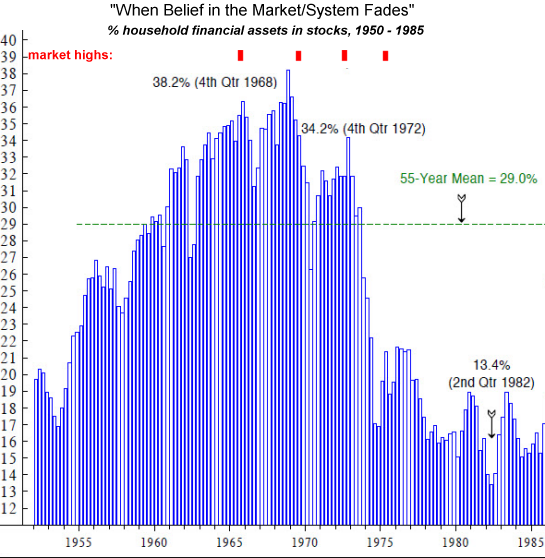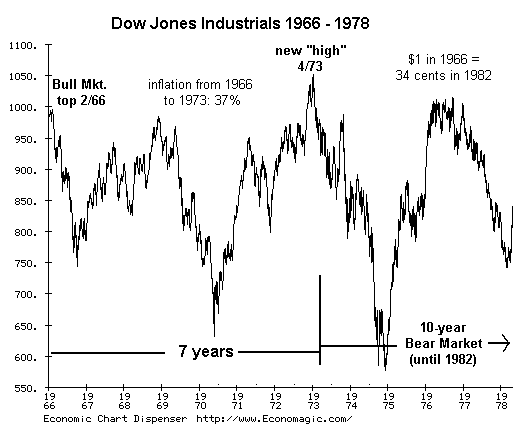When Belief in the System Fades, Stock Market Version
by Charles Hugh Smith
Astute reader John M. recently offered this commentary on the news that Americans pulled money out of stock mutual funds in 2009, despite the glorious "nascent recovery rally" engineered by the Fed and Wall Street. That item can be found inThe Wisdom of Crowds: Americans Refusing To Buy Into the Rally (March 19, 2010).
According to this article, How Greed and Fear Kill Returns (NY Times), American investors put an estimated $506 billion into mutual funds in the past year, of which $409 billion went into bond funds. My guess is the balance went into overseas funds, currency/FX (foreign exchange) funds or commodity (oil, gold, etc.) funds.
The writer concluded, "The point is to recognize that, in aggregate, investors tend to be very bad at timing the market." Or in other words, avoiding stocks is simple the result of "dumb money/investors" doing the opposite of what they should have done to profit handsomely.
John M. offers a historical perspective on the issue:
I enjoyed your recent article about redemptions from equity mutual funds. I thought I'd provide a couple of historical examples where Americans redeemed more from funds than they put in, and significant bear markets followed shortly afterward.At the top of the Dow's bull market in fall 1976 (the Dow had rallied 75% from the 1974 lows), Americans were pulling money out of equity mutual funds at a record rate. This was followed by a 27% drop in the Dow in 1977-78. Here's a news article about it from '76:
Here's another example, from 1972. Americans pulled more money out of equity funds in '72 than they put in, and this was followed by a 50% bear market in 1973-74:
Actually, starting in 1972, there were more outflows than inflows in equity mutual funds throughout the 70s, and the Dow went nowhere between 1972 and 1982.
A counter-example would be 1988, when Americans pulled more out of equity funds than they put in due to jitters from the '87 crash, but the market continued to do well in 1989-99.
So it's not really a definitive indicator, but it's interesting that a similar pattern was developing in the early 70s with mutual fund inflows/outflows as the public slowly became disenchanted with stocks after the go-go 50s and 60s, and the market went sideways for 10 years from '72-'82.
Thank you, John, for a timely reminder about the last "Lost Decade." Maybe retail investors weren't so dumb after all.
Within the context of the Survival+ analysis, I think the investing public's distrust of the stock market is merely one manifestation of a much larger and more powerful cultural trend that I call When Belief in the System Fades (March 12, 2008):
In a way, a belief in the value, transparency, trust and reciprocity of the System is like a religious belief. The converts, the true believers, are the ones who work like crazy for the company, or the Force or the firm. And when the veil of illusion is tugged from their eyes, then the Believer does a reversal, and becomes a devout non-believer in the System. He or she drops out, moves to a lower position, or "retires" to some lower level of employment.
The belief that the stock market is trustworthy and transparent is also like a religious faith. Americans have lost that "religion"--and their faith in the trustworthiness of the entire fraudulent doomed carcass of American finance.
Hapless investors saw trillions of dollars of their hard-earned wealth destroyed in the dot-com meltdown, and they came to learn that insiders had distributed their shares during the run-up, leaving the investing public as bagholders when that bubble collapsed.
Their faith in the system was only shaken, however, and they dutifully piled back into stocks in the 2003-2007 time period, as the "smart money" bet on a collapse of the housing/credit bubble and on the fall of all the Wall Street firms which had profited from selling the fraudulent MBS and derivatives generated by the housing bubble.
Twice burned, trice shy. Now that American retail investors lost 40+% of their wealth in the 2008 stock meltdown ("global financial crisis"), they finally "get it:" Wall Street is a machine run on embezzlement, fraud, willful obscurity in service to information asymmetry, extreme leverage, predation, disinformation and malignant malinvestments in parastic speculations with no value except transactional churn.
Yes, investing in long-term bonds sure looks like a bad bet, as interest rates are sure to rise, despite the prognostications of Fed Chairman Ben Bernanke ("Away, tides! I speak for the mighty Federal Reserve!"). But "belief in the system has faded" and it won't return until the system is cleaned out of scum, fraud, obscurity and all the structural rot at the very heart of a predatory American financial system (and by extension, its political system as well).
This aligns with the public's reluctant grasp of the political and financial rot at the center of the U.S. Empire in the 1970s. Watergate was simply a bungled offshoot of an entire political and financial system built on disinformation, propaganda, manipulation, and criminal activities pursued in the name of "national security."
A new "improved" credit bubble took hold in 1982, and that expansionary-credit-based prosperity based on cheap oil lasted a good 25 years (1982-2007). But now the bubbles have all been blown and the bubble-blowing elixir (exponential expansion of credit) has lost its magic. To cover up the endgame, the Powers That Be are reduced to manipulation and propaganda. The public senses that the manipulations are not sustainable or credible, and so they once again reluctantly conclude that the predatory system does not serve their best interests.
Their belief that it once did was an illusion, but credit expansion masks a variety of bedevilments.
Here are two charts illustrating how the market responded in the 1970s as belief in the market/system faded and people pulled their assets out of stocks. Notice that even as the purchasing power of the the U.S. dollar sank, the market kept rallying madly, again and again and again, even as investors stampeded out of the arena.
So who was left to drive the market rallies in an empty arena? That's a good question to keep asking as investors once again leave the stock market arena.


If you haven't visited the forum, here's a place to start. Click on the link below and then select "new posts." You'll get to see what other oftwominds.com readers and contributors are discussing/sharing.
DailyJava.net is now open for aggregating our collective intelligence.
Order Survival+: Structuring Prosperity for Yourself and the Nation and/or Survival+ The Primer from your local bookseller or from amazon.com or in ebook and Kindle formats.A 20% discount is available from the publisher.
Of Two Minds is now available via Kindle: Of Two Minds blog-Kindle
| Thank you, Timothy T. ($10), for your very generous donation to the site (in response to my 2/21 rant). I am greatly honored by your support and readership. | Thank you, Tyler T. ($50), for your outrageously generous donation to the site (in response to my 2/21 rant). I am greatly honored by your support and readership. |




























